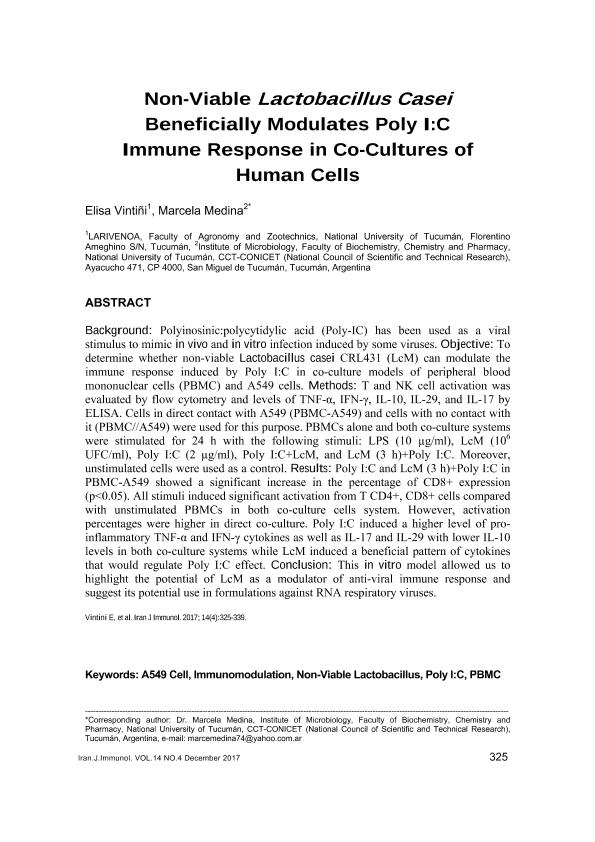Mostrar el registro sencillo del ítem
dc.contributor.author
Vintiñi, Elisa Ofelia

dc.contributor.author
Medina, Marcela Susana

dc.date.available
2018-12-20T14:12:45Z
dc.date.issued
2017-12
dc.identifier.citation
Vintiñi, Elisa Ofelia; Medina, Marcela Susana; Non-Viable Lactobacillus Casei Beneficially Modulates Poly I:C Immune Response in Co-Cultures of Human Cells; Shiraz Inst Cancer Res; Iranian Journal Of Immunology; 14; 4; 12-2017; 325-339
dc.identifier.issn
1735-1383
dc.identifier.uri
http://hdl.handle.net/11336/66817
dc.description.abstract
Background: Polyinosinic:polycytidylic acid (Poly-IC) has been used as a viralstimulus to mimic in vivo and in vitro infection induced by some viruses. Objective: To determine whether non-viable Lactobacillus casei CRL431 (LcM) can modulate the immune response induced by Poly I:C in co-culture models of peripheral blood mononuclear cells (PBMC) and A549 cells. Methods: T and NK cell activation was evaluated by flow cytometry and levels of TNF-α, IFN-γ, IL-10, IL-29, and IL-17 by ELISA. Cells in direct contact with A549 (PBMC-A549) and cells with no contact with it (PBMC//A549) were used for this purpose. PBMCs alone and both co-culture systems were stimulated for 24 h with the following stimuli: LPS (10 µg/ml), LcM (106 UFC/ml), Poly I:C (2 µg/ml), Poly I:C+LcM, and LcM (3 h)+Poly I:C. Moreover, unstimulated cells were used as a control. Results: Poly I:C and LcM (3 h)+Poly I:C in PBMC-A549 showed a significant increase in the percentage of CD8+ expression (p<0.05). All stimuli induced significant activation from T CD4+, CD8+ cells compared with unstimulated PBMCs in both co-culture cells system. However, activation percentages were higher in direct co-culture. Poly I:C induced a higher level of proinflammatoryTNF-α and IFN-γ cytokines as well as IL-17 and IL-29 with lower IL-10levels in both co-culture systems while LcM induced a beneficial pattern of cytokines that would regulate Poly I:C effect. Conclusion: This in vitro model allowed us to highlight the potential of LcM as a modulator of anti-viral immune response and suggest its potential use in formulations against RNA respiratory viruses.
dc.format
application/pdf
dc.language.iso
eng
dc.publisher
Shiraz Inst Cancer Res

dc.rights
info:eu-repo/semantics/openAccess
dc.rights.uri
https://creativecommons.org/licenses/by-nc-sa/2.5/ar/
dc.subject
Poly I.C
dc.subject
Antiviral Immune Response
dc.subject
Non Viable Lactobacillus
dc.subject
Pbmc/A549
dc.subject.classification
Salud Ocupacional

dc.subject.classification
Ciencias de la Salud

dc.subject.classification
CIENCIAS MÉDICAS Y DE LA SALUD

dc.title
Non-Viable Lactobacillus Casei Beneficially Modulates Poly I:C Immune Response in Co-Cultures of Human Cells
dc.type
info:eu-repo/semantics/article
dc.type
info:ar-repo/semantics/artículo
dc.type
info:eu-repo/semantics/publishedVersion
dc.date.updated
2018-12-05T14:46:16Z
dc.identifier.eissn
1735-367X
dc.journal.volume
14
dc.journal.number
4
dc.journal.pagination
325-339
dc.journal.pais
Irán

dc.journal.ciudad
Shiraz
dc.description.fil
Fil: Vintiñi, Elisa Ofelia. Universidad Nacional de Tucumán. Facultad de Agronomía y Zootecnia; Argentina
dc.description.fil
Fil: Medina, Marcela Susana. Consejo Nacional de Investigaciones Científicas y Técnicas. Centro Científico Tecnológico Conicet - Tucumán; Argentina. Universidad Nacional de Tucumán. Facultad de Bioquímica, Química y Farmacia; Argentina
dc.journal.title
Iranian Journal Of Immunology

dc.relation.alternativeid
info:eu-repo/semantics/altIdentifier/url/http://iji.sums.ac.ir/article_39328_f12863523edece69a6bfabf6e8c2692e.pdf
Archivos asociados
